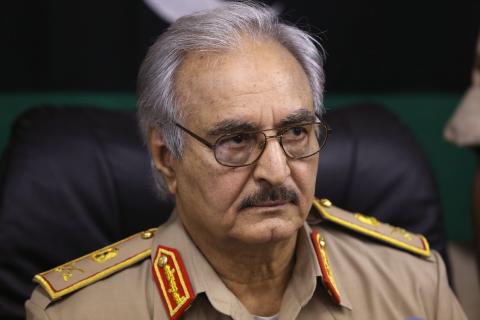Advertisement
Libyan parliament proposes Haftar to lead army: spokesman
BENGHAZI, Libya (Reuters) - The president of Libya's elected parliament has proposed appointing army general Khalifa Haftar as top army commander, parliament's spokesman said on Wednesday.
The decision shows the increasing influence of military figures in the official government and parliament, which has been forced to operate from eastern Libyasince an armed group called Libya Dawn seized the capital Tripoli in summer.
"Mr Aguila Saleh (parliament's president) has proposed to appoint Haftar," spokesman Farraj Hashem told Reuters. "The House of Representatives supports this."
He said a decree appointing Haftar would still need to be signed by Saleh, who has quasi-presidential powers.
Haftar, an army general, has emerged as would-be strongman in the east, where the internationally recognised prime minister, Abdullah al-Thinni, has been based since losing control of Tripoli.
Haftar, who helped Muammar Gaddafi into power before falling out with him in the 80s and joining the 2011 uprising against his rule, has merged his forces with army troops in the east to fight Islamist groups including Libya Dawn?.
While the alliance has managed to win back some territory in Benghazi, Haftar has drawn criticism for ordering air strikes on civilian airports and seaports.
Critics say Haftar is sidelining Thinni and sees himself as the Libyan version of Egyptian President Abdel Fattah al-Sisi, the former defence minister who toppled an Islamist president after mass protest to his rule.
The rival government controlling Tripoli and much of western Libya accuses Haftar of trying to reinvent the old Gaddafi police state.
But the grey-haired general also enjoys some support among normal people frustrated with hardships in the east, where a violent conflict between the two competing governments has made petrol, electricity and medicines scarce.
Protesters have in the past few weeks in major eastern cities demanded that Thinni quit and hand power to a military council headed by Haftar.
Thinni, whose government has struggled to make an impact working out of hotels in a small eastern city, has sought to address critics from military figures who labelled him as weak.
On Tuesday, he accused the United States, Britain and European Union for failing to supply arms to his forces.



















Add new comment